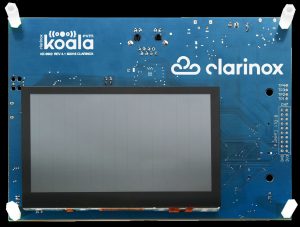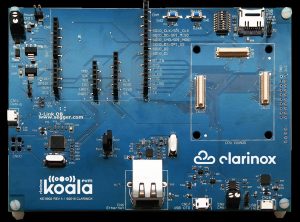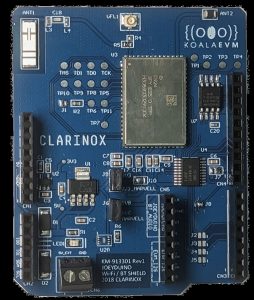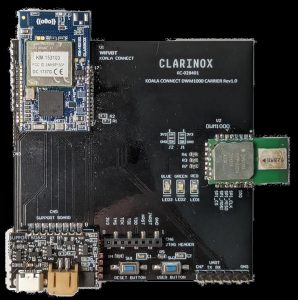ClarinoxBlue
ClarinoxBlue™, the most comprehensive Bluetooth® stack solution in the embedded market
ClarinoxBlue™ protocol stack was designed by embedded developers for embedded developers. With a simple and flexible approach, the ClarinoxBlue protocol stack enables you to spend more time on your application rather than the inner workings of Bluetooth technology. Designed for Bluetooth Classic (BR/EDR) and Bluetooth Low Energy (BLE), our solution addresses the main issues confronted by engineers in Bluetooth projects; lack of flexibility, increasing complexity, and difficulty of debugging. The ClarinoxBlue protocol stack excels in flexibility and portability, can successfully manage complexity, and simplify debugging efforts, making your next Bluetooth project a whole lot easier!
ClarinoxBlue Features
Dual-mode or single-mode Bluetooth/BLE stack options available
Multiple simultaneous profiles and multiple simultaneous roles
Separates applications from profiles
Supports blocking and non-blocking API calls
Enables single and multi-threaded applications
Integrates command/response based APIs
Suitable for applications in consumer, industrial, transport and health & medical devices
Modularized architecture, BSP abstracts stack from H/W & RTOS
Scalable architecture from Cortex M0 to high-end multicore
Support for many CPUs
Support for many RTOS
API supports single-threaded and/or complex multi-threaded
Deterministic behavior by design based upon Clarinox cooperative tasking
Simultaneous Bluetooth and Wi-Fi, or simultaneous roles in Wi-Fi, or simultaneous profiles and roles within Bluetooth
Bluetooth Simultaneous Roles & Profiles
- Classic Profiles: A2DP, AVRCP, BIP, BPP, CTN, DID, DUN, FTP, GAP, GAVDP, GOEP, HCRP, HDP, HFP, HID 1.1, HSP, IOP, MAP, MPS, OPP, PAN, PBAP, SPP
- Classic Protocols: AVCTP, AVDTP, BNEP, HCI, L2CAP, MCAP, OBEX, RFCOMM, SDP
- BLE Profiles / Services: AIOP, AIOS, ANP, BAS, BCS, BLP, BLS, BMS, CGMP, CGMS, CSCP, CSCS, CPP, CPS, CTS, DIS, ESP, ESS, FMP, FTMP, FTMS, GAP, GLP, GLS, HIDS, HOGP, HPS, HRP, HRS, HTP, HTS, IAS, IPS, IPSP, LLS, LNP, LNS, NDCS, OTS, OTP, PASS, PASP, PLXS, PLXP, PXP, RSCS, RSCP, RTUS, ScPP, ScPS, SM, TDS, TIP, TPS, UDS, WSP, WSS
- BLE Protocols: ATT, GATT, SM
- BLE Mesh: 1.0 in qualification, 1.0.1 in implementation
Flexible: ClarinoxBlue is designed exclusively for the development of embedded Bluetooth applications. The stack handles complex applications utilizing both multiple profiles and multiple local Bluetooth devices.
Portable: The ClarinoxBlue Bluetooth protocol stack is contained within the ClarinoxSoftFrame™ portable framework, allowing users to develop their applications using C/C++ on a desktop environment (Microsoft Visual Studio or GNU tools) and move directly to the target platform with confidence of compatibility. Combined with the compactness of the protocol stack, this enables use with a number of architectures.
Simple API: ClarinoxBlue API greatly reduces application development times. For most applications, the code written based upon ClarinoxBlue will only be one third of the number of lines required for other stacks.
Supported RTOS: AutoSAR – FreeRTOS – ThreadX – CMSIS & RTX – uCos-II/III – embOS /MQX – TI-RTOS / eCos -Nucleus INTEGRITY – QNX – Wind River VxWorks – Windows CE/Mobile (if your RTOS is not listed please contact us)
Supported OS: Linux (Ubuntu)- Embedded Linux / AGL – Mentor Graphics Linux – Wind River Linux – Yocto Linux – Android – Windows 7/8.1/10 (if your OS is not listed please contact us)
Supported MCU/MPU:
Intel x86, Atom, Quark
ARM 7/9/11, A7/A8/A9, A5x, Cortex-M0/M3/M4/M7
Infineon XMC 4700/AurixTC2xx/TC3xx
NXP LPC18xx/43xx/54xxx, i.MX6 / i.MX8 / i.MX28 / i.MX31 / Kinetis K6x / K7x
Renesas S7Gx, SHx, R-Car, RH850
STM32F4xx/ F7xx
TI MSP432, OMAP, Jacinto, Sitara™ 3xx, Tiva™ TM4C12xx.
RISC-V
SPARC-LEON
(if your MCU/CPU is not listed please contact us)
Clarinox Bluetooth Low-Energy Stack (and the new Core Spec. 5.1)
Clarinox Bluetooth Low-Energy (BLE) Stack has evolved over time to support all major GATT-based profiles & services as well as Mesh networking capabilities. The newly released Bluetooth Core Specification v5.1, from the Bluetooth SIG, provides exciting new developments to the Bluetooth community. Bluetooth 5.1 has added the major feature of direction finding, using Angle of Arrival (AoA) and Angle of Departure (AoD), to enhance outdoor and primarily indoor location services.
Clarinox BLE recognizes the addition of AoA & AoD direction finding as an important feature to bring to customers who require Real-Time Locating Services (RTLS), Asset Tracking, and Indoor Positioning Services.
Clarinox Bluetooth Mesh
The Clarinox Bluetooth Low-Energy stack incorporates the latest in mesh networking capabilities, allowing users to create a large-scale network of Bluetooth LE devices communicating to each other in a many-to-many configuration.
Clarinox Bluetooth Classic Stack
The Clarinox Bluetooth Classic stack is our tried & tested Bluetooth solution that has provided many of our customers with successful outcomes – we support most of the vast majority of Classic profiles that are available today.
ClarinoxWiFi
ClarinoxWiFi™, our complete WiFi stack solution.
For over a decade, Clarinox has collaborated with national and international clients to develop breakthrough wireless embedded products. We have used our experience to implement IEEE802.11a/b/g/n, AP, STA, P2P and GO for a range of embedded platforms. Clarinox will make your next embedded WiFi project easier.
ClarinoxWiFi Features
Supports AP, STA and P2P modes
Supports multiple simultaneous roles
ClarinoxSoftFrame architecture isolates the application from lower layers; can be used with any OS and TCP/IP stack
Supports a wide range of embedded platforms
Enables single and multi-threaded applications
Exposes blocking and non-blocking API calls
Built-in protocol analysis tool enables faster debugging
Extensive driver-level API for management and configuration of wireless links and networks
Suitable for applications in info-tainment, data transfer, navigation, video streaming, and health & medical devices
Flexible: ClarinoxWiFi is designed exclusively for the development of embedded wireless LAN applications. The WLAN stack allows users to develop complex applications that support WiFi Station Mode, Access Point Mode, or Peer-to-Peer mode. The stack handles complex applications utilizing both multiple profiles and multiple local Bluetooth® devices, allowing an application to interact with several local Bluetooth devices simultaneously.
Portable: The ClarinoxWiFi WLAN protocol stack is contained within the ClarinoxSoftFrame™ portable framework, allowing users to develop their applications using C/C++ on different hardware and operating system platforms with confidence of compatibility. Combined with the compactness of the protocol stack, this enables use with a number of architectures.
Simple API: ClarinoxWiFi API greatly reduces application development times. The plain language style also facilitates faster test and debug cycles.
ClarinoxWiFi Stack: ClarinoxWiFi stack supports many common WiFi modes for embedded hardware such as Access Point (AP), Station (STA), Peer-to-Peer and WiFi Protected Setup (WPS). ClarinoxWiFi provides a set of APIs for initialization and de-initialization of the WLAN stack and another set of APIs for performing WLAN management operations, such as scanning for access points, connecting, etc. The data traffic is routed through a separate Network Stack Interface layer. ClarinoxWiFi supports many different TCP/IP stacks, i.e. LWIP, RTCS, NETX, Autosar.
For ensuring secure wireless connectivity, the stack supports WPA/WPA2 Personal, WPA/WPA2 Enterprise encryption protocols in station mode operation. It supports encryption protocols WPA/WPA2 Personal for applications using access point mode.
ClarinoxWiFi supports WLAN modules manufactured by Texas Instruments, Marvell and Realtek, i.e WL18xx family, WL12XX family, Mv88w8xxx family and RTL87xx family WLAN modules. The WLAN stack supports both SPI (1 bit SDIO) and SDIO communication interfaces to the WLAN hardware modules, with interface clock speeds as low as 500 kHz for low-speed, low-energy applications using Texas Instruments WL18xx chipsets.
The integrated ClariFi™ Debugger interface of the ClarinoxWiFi provides useful insights into the operation of the WLAN stack. This includes debug information spanning from low level WLAN module commands all the way up to TCPIP protocol message wireshark views.
ClariFi Debugger
ClariFi™ debugger and protocol analyzer: A game changer in wireless debugging.
Clarinox debug tools provide built-in protocol analyzer support for faster debugging of complex wireless devices. In addition it offers threading, memory usage, and memory leak analysis. Together, these tools support the tuning of applications and aid in the communication of issues. The user is able to add custom plug-ins as required with a console interface via a single physical medium.
ClariFi Debugger may be used in two distinct modes. First, as an advanced logger, and second, as an interactive tool to run required tests on the target device.
Interaction with the target device may be achieved via the Clarinox Lua debugging interface which enables Lua scripts to run in the ClariFi Debugger environment.
Users communicate possible issues by storing and exchanging debugger log files with their team members or with Clarinox.
Plug-ins can pass specific messages to the debug tools sent by the debug target. By defining plug-ins via the plug-in interface, flexibility is provided for developers to add their own debugging functionality.
ClariFi Debugger Features
Detailed analysis of the implementation
Capture debugging data on demand
Protocol/application performance analysis
Interactive testing without re-compile
Connect via Ethernet, JTAG, UART
Post processing for test results debugging
API messaging between processors when using RPC
Debugging rare occurring issues
Analyzing memory use and leakage
Analyzing performance
Plugins may be developed in C++ or Lua
Simple to use and easy to follow
Every engineer has access
Reduce overall debug times
LUA scripting support
Detailed analysis of the implementation
Customer protocol/application performance analysis
Enables interactive testing without re-compiling the code
Post processing for test results debugging
Debugging rare occurring issues
Analyzing memory usage
Analyzing performance
Clarinox Hardware
Koala EVM


Koala EVM Features
Replaceable MCU for varying embedded development needs
Supports a range of wireless modules for Wi-Fi, Bluetooth and Bluetooth LE application development
Combine with Clarinox wireless stacks and APIs for fast development
4MB Flash Memory
64MB SDRAM
CAN Bus
Arduino-Connector
Koala Joeyduino Wireless Module interface
UART Bluetooth interface
SPI/SDIO Wi-Fi interface
I2C interface
Ethernet 10/100Mbit Ethernet
Micro-SD card connection with 4bit SDIO
USB Onboard J-Link JTAG programming
Micro USB-OTG FS device and host roles
Mini USB UART bridge for debugging
Display 4.3”480 x 272 RGB (CTP) Capacitive touch screen
I2C touch screen interface
Camera
1 / 2 M, 8-bit parallel interface
Continuous capture at up to 20 FPS
Optimal for OV9655 cameras
Power Supply USB or external 5V supply
Temperature Rating of -40°C to 85°C
Supported Development Toolchains: ARM® Keil® MDK, Mentor Graphics® Sourcery™ CodeBench, IAR Embedded Workbench®,
Supported OS/RTOS: embOS, FreeRTOS™, Nucleus® RTOS, ThreadX®, uC/OS-III®
Koala EVM Joeyduino Wireless Module

Koala EVM Joeyduino Wireless Module Features
Enables simultaneous Bluetooth and Wi-Fi technologies
- Arduino compatible pinout
- Wi-Fi & Bluetooth antenna coexistence
- STA, AP & Wi-Fi Direct Mode
- Combine with Clarinox wireless stacks and APIs
to reduce design/development headaches
Koala Carrier Joeyduino

Koala Carrier Joeyduino Features
H/W interface for Koala® EVM Blue and Sensor Board
128MB Flash memory
Temperature sensor
3.3V-5V external power supply
Micro USB connection
Test points for JTAG, UART, USB, SPI signals
Supported toolchains: GCC/Eclipse, Keil MDK-ARM, IAR EWARM
Koala Connect Positioning Solution

Koala Connect Positioning Solution Features
- Carrier for Koala Connect BT/BLE & WiFi module
- 802.15.4-2011 UWB compliant module
- Time-of-Flight (ToF)/Time-Difference-of-Arrival (TDoA)
distance measurement with 1 cm resolution
- 64Mb External Flash Memory
- Lipo Battery support
- UART & JTAG debugging interface
Other Add on Modules
FCC & CE Certified Koala Connect BT/BLE & WiFi
Yulo Connect
Koala EVM NXP MCU Board
Use Cases: Health & Medical, Smart Home, Consumer Electronics, Industrial Automation

